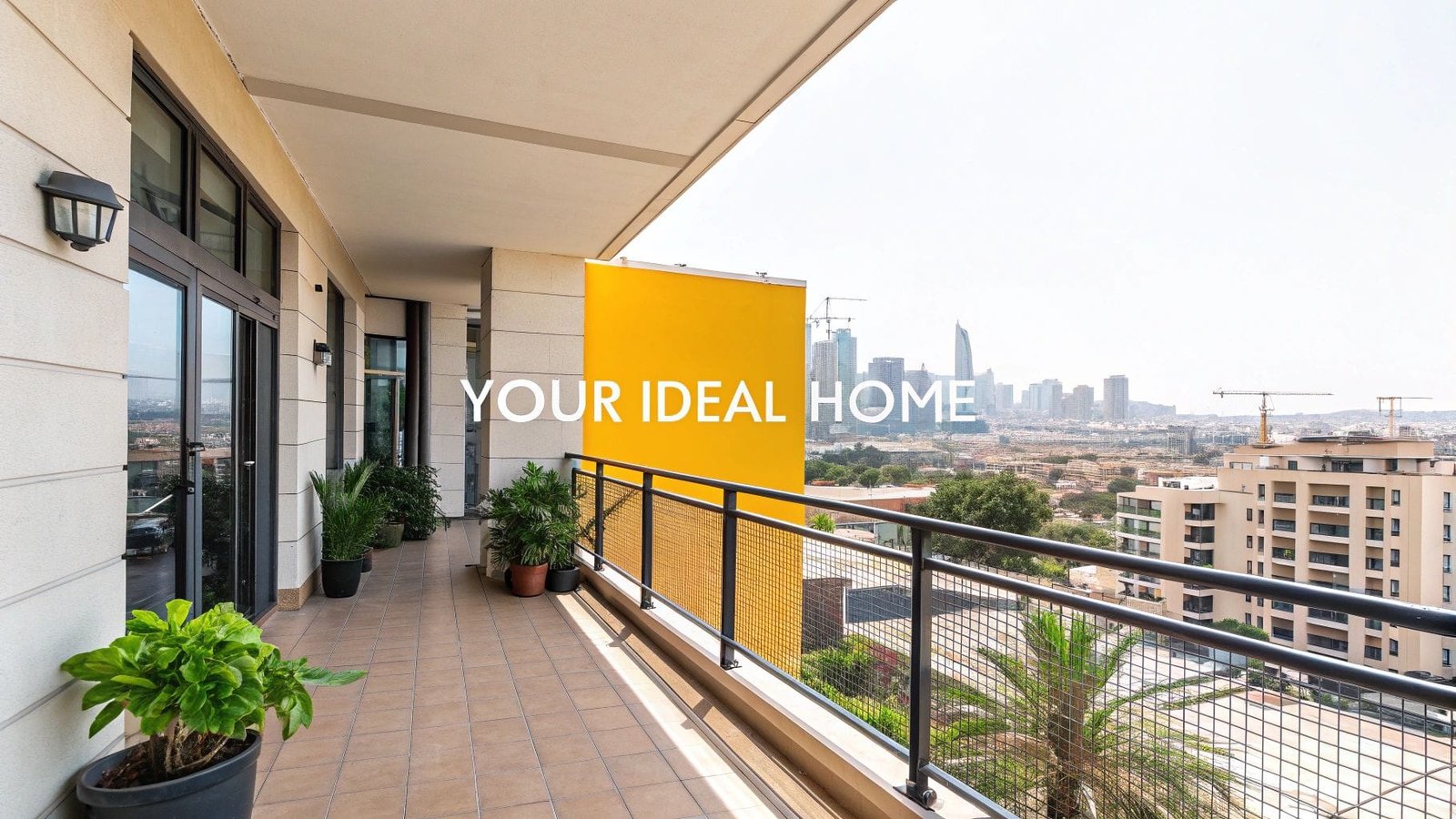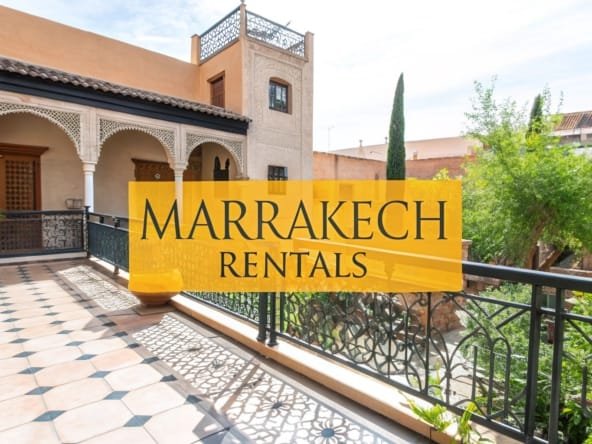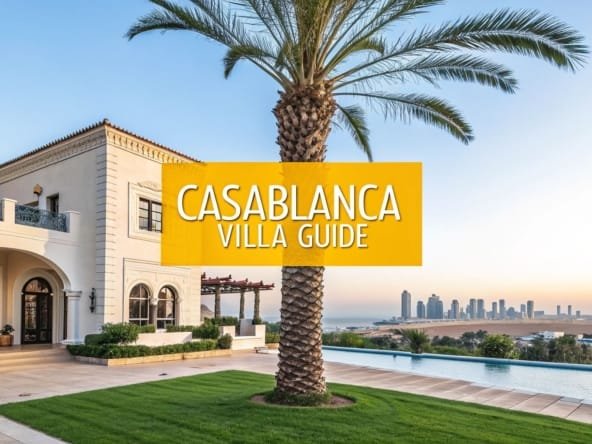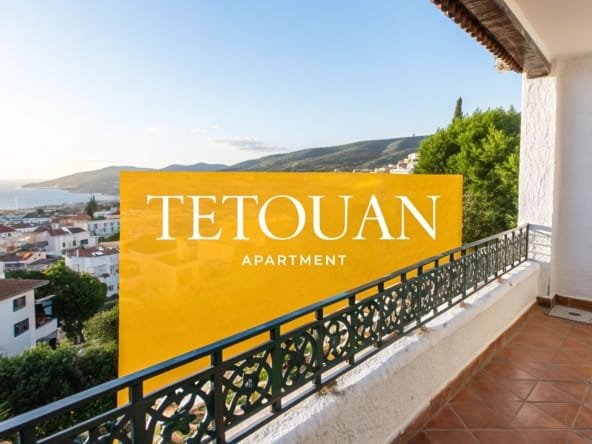It’s easy to get carried away when you start looking for an appartement a louer casablanca. The thrill of scrolling through online listings is real, but the most successful renters I’ve worked with all start with a solid financial plan. Honestly, a realistic budget is your most powerful tool. It transforms a potentially stressful process into a confident, targeted hunt for your new home, protecting you from overspending so you can actually enjoy life in this incredible city.
Setting Your Casablanca Rental Budget
Before you set your heart on a sun-drenched balcony in Gauthier or a spacious flat in Racine, you need to get real about the full financial picture. That price you see on a listing? It’s just the beginning. A smart budget accounts for the rent itself, plus all the associated monthly and one-time costs that come with securing an apartment.
Doing this groundwork is non-negotiable for a smooth experience. When you know exactly what you can afford, you can filter your search effectively, negotiate with confidence, and avoid that awful feeling of financial strain down the line. It's the difference between just finding a place to live and finding the right place for your lifestyle.
Beyond the Monthly Rent
Your total housing cost will always be more than the number on the lease. To build an accurate budget, you absolutely have to factor in several other key expenses that pop up every month.
- Utilities: This covers electricity, water, and sometimes gas. These costs can swing quite a bit depending on the season and your own personal habits.
- Internet and TV: A separate but essential monthly bill. Casablanca has several providers offering different packages, so it’s worth comparing.
- Syndic Fees: Think of these as building maintenance charges. They cover the cleaning of common areas, elevator upkeep, and security. Always, and I mean always, ask if this is included in the rent or paid separately.
- Furnishing Costs: If you’re eyeing an unfurnished place, you'll need to budget for everything from a bed and sofa to kitchen utensils.
As a rule of thumb I always share with clients, aim to keep your total housing expenses—rent plus all these associated costs—from exceeding 30-35% of your net monthly income. Sticking to this simple guideline ensures you have enough left for savings, transport, and enjoying everything Casablanca has to offer.
One-Time Upfront Costs
Beyond the recurring monthly payments, securing your appartement a louer casablanca requires a significant upfront investment. As you get your finances in order, be ready for these:
- Security Deposit (Caution): This is almost always equivalent to two months' rent. It’s a refundable deposit the landlord holds to cover any potential damages.
- First Month's Rent: You’ll pay this in advance, right along with the security deposit.
- Agency Fees (Frais d'agence): If you use a real estate agent (samsar), their commission is typically equal to one month's rent.
It’s also wise to keep an eye on the market's pulse. For instance, as of early 2025, Casablanca's residential rental market has been seeing a steady price increase of around 2% annually. This is driven by the city's non-stop growth and the high demand for quality housing. You can dive deeper into these market dynamics and what they mean for renters on Sands of Wealth. This constant demand is what keeps the market so competitive.
To give you a clearer picture of what to expect, here’s a breakdown of potential costs in different scenarios.
Estimated Monthly Rental Budget in Casablanca
This table breaks down the average monthly rental costs and associated expenses you might encounter, depending on the apartment size and the type of neighbourhood you choose.
| Item | Studio/1-Bedroom (Mid-Range Neighbourhood) | 2-3 Bedroom (Premium Neighbourhood) |
|---|---|---|
| Average Monthly Rent | 4,000 – 6,500 MAD | 9,000 – 18,000 MAD |
| Estimated Utilities | 400 – 600 MAD | 700 – 1,200 MAD |
| Syndic Fees | 150 – 300 MAD | 400 – 800 MAD |
| Internet | 200 – 300 MAD | 200 – 500 MAD |
| Total Estimated Monthly | 4,750 – 7,700 MAD | 10,300 – 20,500 MAD |
| Upfront (Deposit + Fees) | 12,000 – 19,500 MAD | 27,000 – 54,000 MAD |
Remember, these are estimates to guide you. Your actual costs will vary based on the specific property and your lifestyle, but this should give you a solid foundation for building your personal budget.
Finding the Right Casablanca Neighbourhood
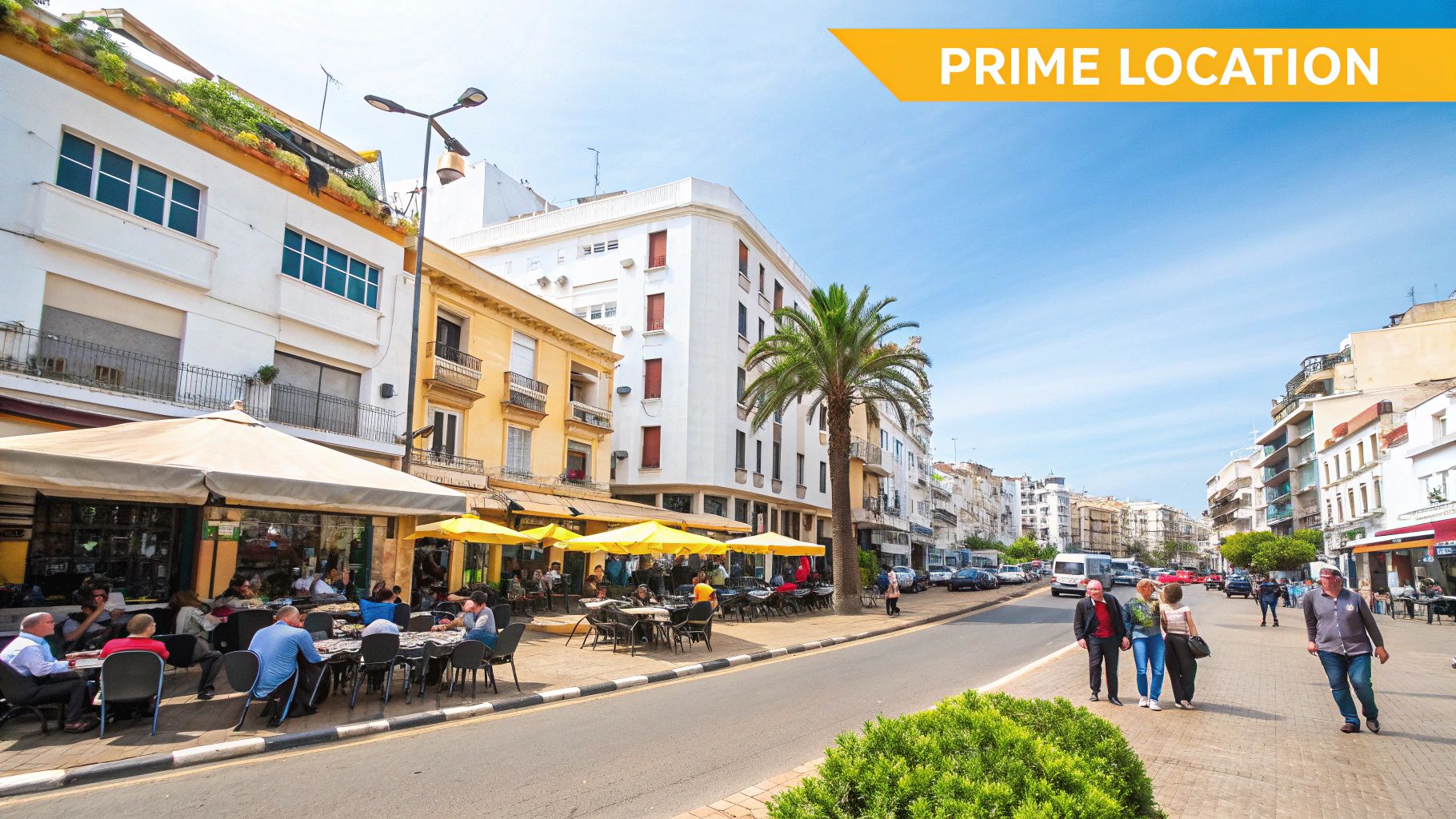
Choosing a neighbourhood in Casablanca isn't just about picking an address; it’s about choosing your lifestyle. Where you decide to live will shape your daily commute, your social circle, and how you experience this incredible city. After you’ve sorted out your budget, this is easily the biggest decision you'll make in your rental journey.
Forget the tourist maps for a moment. Let's look at these districts through the eyes of someone who actually lives here. We’ll dig into the real character of the places where you're most likely to find an appartement a louer casablanca, weighing the atmosphere, convenience, and of course, the cost.
Gauthier and Racine: The Modern Hubs
For most young professionals and expats landing in Casablanca, the search begins and often ends in Gauthier or its sophisticated neighbour, Racine. These districts are the city's cosmopolitan heart, humming with energy from trendy cafés, world-class restaurants, and stylish boutiques. If your ideal weekend involves brunch with friends, exploring art galleries, and being a stone's throw from a buzzing nightlife, this is your turf.
Of course, all this vibrancy comes at a price. Rents here are some of the highest in the city, but what you’re paying for is unparalleled convenience. Many corporate headquarters are within walking distance, and with easy access to taxis and the tramway, getting around without a car is perfectly feasible.
For those seeking a "plug-and-play" lifestyle, Gauthier and Racine are hard to beat. The premium price buys you a dynamic, international environment and unbeatable access to modern amenities, making it a top choice if convenience is your main priority.
Ain Diab: The Coastal Escape
If the thought of waking up to the sound of the Atlantic is what you dream of, then point your search towards Ain Diab. This neighbourhood stretches along the coast, offering a much more relaxed, almost resort-like vibe compared to the downtown hustle. It’s the home of Casablanca’s famous Corniche promenade, beach clubs, and surf spots.
Living here is a conscious choice to embrace a coastal lifestyle, making it a fantastic option for families or anyone who craves open space and fresh sea air. The trade-off? The commute. Getting into the central business districts can be a real headache during rush hour, so you'll almost certainly need a car to live here comfortably.
Sidi Maarouf: The Business and Tech Centre
Over the last decade, Sidi Maarouf has exploded into Casablanca's primary business and technology corridor, anchored by the massive Casanearshore and Technopark complexes. For anyone working in these hubs, the appeal is obvious: a short, stress-free commute. This practical advantage is the engine driving its rental market.
The area is dominated by modern, purpose-built apartment buildings, which often come with perks like secure parking and shared gardens.
- Proximity to Work: The number one reason people move here is to be minutes from major multinational offices.
- Modern Housing: Expect to find newer buildings with contemporary layouts and facilities.
- Growing Amenities: While it might lack the old-world charm of other districts, its infrastructure of shops, gyms, and restaurants is improving all the time.
Sidi Maarouf is more functional than it is poetic, but for those who put a premium on work-life balance and modern living, it’s a smart and increasingly popular choice.
Habous: The Authentic Charm
For a taste of something truly Moroccan, yet without sacrificing order and accessibility, the Habous quarter is a real gem. Often called the New Medina, it was designed in the 1920s with a unique blend of traditional Moroccan architecture and French urban planning. The result is a stunning neighbourhood of clean alleyways, graceful archways, and artisan shops.
Renting an appartement a louer casablanca in Habous means immersing yourself in a more authentic local culture while still enjoying a beautifully structured community. It's quieter than the city centre, with a peaceful, residential feel and a strong sense of community. Known for its traditional markets, bookshops, and legendary patisseries, Habous offers a tranquil retreat that feels a world away from the city's commercial core, yet is only a short taxi ride from it. The unique character of districts like this is a key reason why Casablanca has become Morocco's hottest real estate hub.
Making the Most of Apartment Viewings
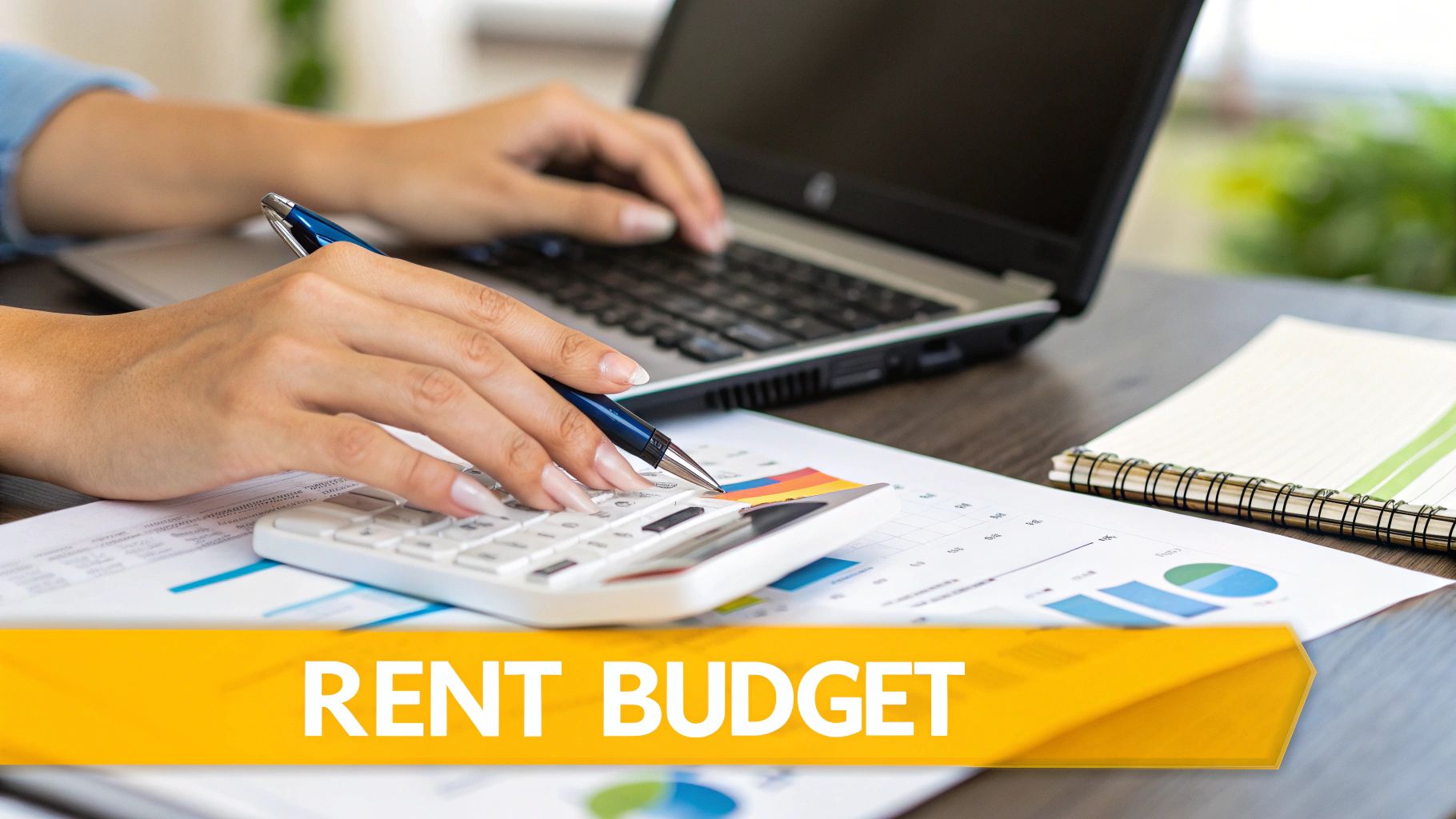
So, you’ve nailed down your budget and have a few Casablanca neighbourhoods in your sights. Now for the exciting part—actually seeing some places. This is the moment your search for an appartement a louer casablanca gets real. It's also where being methodical can save you a world of trouble down the line.
Your search will likely pull you in two directions: the huge online portals and the traditional, on-the-ground real estate agents, known here as a samsar. Both have their advantages, and honestly, the best strategy is usually a mix of both. Casting a wide net is key.
Where to Find Your Future Home
The obvious first stop for most people is an online portal like Mubawab or Avito. They are fantastic for getting a feel for the market. You can filter by price, neighbourhood, and size, letting you quickly build a shortlist without leaving your sofa.
But don't write off the local samsar. These agents have a level of street-smart knowledge that websites just can't match. They often know about apartments that never get listed online and can give you the real story on a building's reputation or the landlord's character. Yes, they charge a fee—usually the equivalent of one month's rent—but for someone new to the city, their insight can be invaluable.
The Viewing: Your Inspection Checklist
It’s easy to get swept up in the moment. A fresh coat of paint, a sunny balcony, a modern kitchen—these things can distract you from what really matters. A successful viewing means looking past the superficial and playing detective.
I always recommend bringing a checklist. It’s not about being rigid; it’s about making sure you don't forget the small, crucial details in your excitement.
I’ll never forget a client who fell head over heels for a gorgeous flat in Gauthier. The place was stunning. The problem? They only realised after moving in that the water pressure was barely a trickle. Always, always test everything. A five-minute check can save you a year of daily frustration.
Your Must-Check List During a Viewing:
- Water Pressure & Plumbing: This is a big one. Turn on every single tap—kitchen, bathroom, and especially the shower. See how long it takes for the water to get hot and feel the pressure. Flush the toilets and take a quick peek under the sinks for any drips or water stains.
- The Electricals: Flick every light switch. It's also a good idea to bring a phone charger to test a few different outlets. In older buildings, don't be shy about asking when the wiring was last updated.
- Phone & Internet Signal: A modern-day essential that’s so easy to forget. Walk through the different rooms and check the bars on your phone. A dead zone in your own living room is a real pain.
- Signs of Damp: Look for trouble. Check ceilings, peek into the corners of rooms, and look inside wardrobes and cabinets for any flaky paint, dark spots, or musty smells. These can signal bigger, more expensive problems.
- Windows & Doors: Do they open, close, and lock properly? A good seal is crucial for keeping out noise and dust, not to mention for your security and energy bills.
Asking the Questions That Matter
The viewing isn't just a tour; it's an interview. The answers you get from the agent or landlord are just as revealing as the physical state of the apartment.
Having a few smart questions ready shows you’re a serious, clued-in tenant.
Key Questions to Ask:
- "Are the syndic fees (building maintenance) included in the rent?" This can be a nasty surprise if it's an extra cost each month.
- "What's this area like in the evening or on weekends?" A street that’s peaceful on a Tuesday morning might be a party central on a Friday night.
- "Why did the last tenant move out?" Their answer, or how they answer, can sometimes hint at issues with the flat or the landlord.
- "Is there any construction planned for this building or nearby?" Waking up to a building site for six months is something you want to know about in advance.
- "How are repairs handled here?" It’s important to know who you call and how responsive they are when something breaks.
By pairing a thorough physical check with these kinds of targeted questions, you move beyond just "liking" a place. You're properly evaluating it. This is how you make sure the appartement a louer casablanca you choose is one you’ll be truly happy in.
Long-Term Leases vs Short-Term Rentals
When you start your search for an appartement a louer casablanca, one of the first big decisions you’ll need to make is about timing. Are you settling in for the long haul, or do you need something more flexible? Casablanca's rental market caters to both, but your choice between a long-term lease and a short-term let will fundamentally shape your budget and lifestyle here.
The traditional path is a long-term lease, usually for a year or more. This route offers stability, a predictable monthly rent, and the chance to really settle in and make a space feel like home. It’s the go-to option for professionals relocating for work, families, or anyone planning an extended stay in the city.
On the other hand, short-term rentals, popularised by platforms like Airbnb, provide incredible flexibility. They're perfect if you’re here for a temporary work contract, want to "try out" a neighbourhood before committing, or simply aren't sure what your plans are yet. The big plus? They usually come fully furnished, which saves a lot of upfront cost and effort.
Financial and Lifestyle Trade-Offs
The most significant difference comes down to money. A long-term lease almost always means a lower monthly rent. In contrast, short-term lets charge a premium for their convenience and flexibility. You could easily find yourself paying 30-50% more per month for a furnished short-term place compared to a similar, unfurnished apartment on a year-long contract.
This infographic gives you a snapshot of key market data, including typical rents and features, to help you get a feel for the numbers.
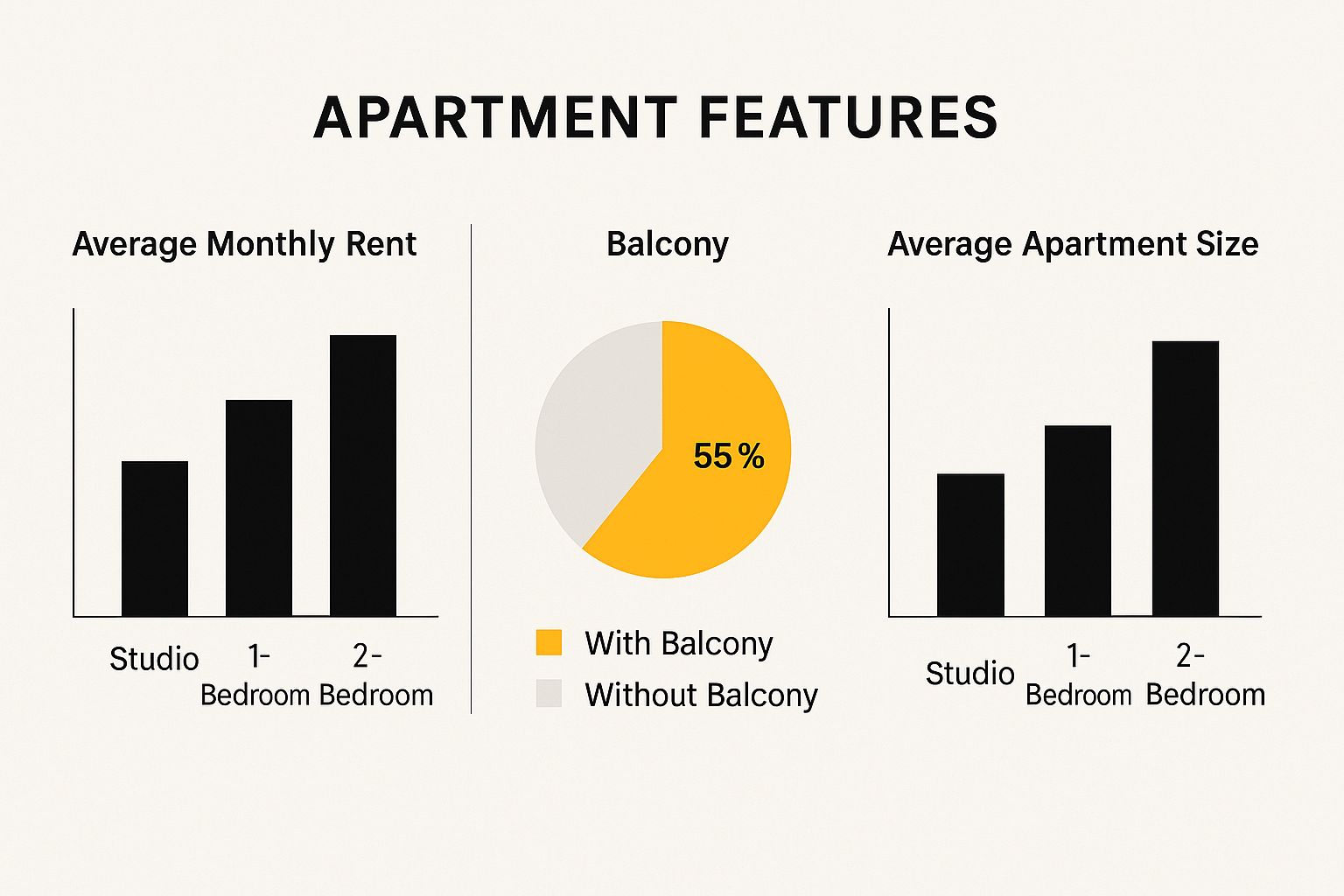
As the data shows, you'll pay more for extra space, and while features like balconies are common, they're not a given.
Still, the higher monthly cost of a short-term rental isn't the whole story. You're not locked into a long commitment, utility bills are often rolled into the price, and you completely sidestep the hefty initial expense of buying furniture and setting up a home from scratch.
Comparing Your Options Side-by-Side
To make the right call, it helps to see the key differences clearly. Both rental types have distinct financial and lifestyle implications that suit different needs. This table breaks down what you can expect from each.
| Feature | Long-Term Rental (12+ Months) | Short-Term Rental (e.g., Airbnb) |
|---|---|---|
| Monthly Cost | Lower, more predictable monthly rate. | Significantly higher (often 30-50% more) for the same size/location. |
| Upfront Investment | Requires a security deposit, first month's rent, and often the cost of buying furniture. | Minimal upfront cost; typically just the booking fee. No need to buy furniture. |
| Flexibility | Low. A binding contract makes it difficult and costly to leave early. | High. You can book for weeks or months and extend or move on as needed. |
| Amenities | Usually unfurnished. Utilities (water, electricity, internet) are separate and your own cost. | Almost always fully furnished. Utilities and Wi-Fi are typically included in the price. |
| Sense of Home | High. You have the freedom to decorate and personalise the space to make it your own. | Low. The space is owned by someone else; personalisation is limited or not allowed. |
| Best For | Individuals, couples, or families planning to stay in Casablanca for a year or more. | Expats on short assignments, digital nomads, or anyone needing temporary housing. |
Ultimately, the choice hinges on your priorities. A long-term lease offers financial savings and stability, while a short-term rental provides unmatched convenience and flexibility at a premium price.
The Short-Term Rental Scene in Casablanca
Thanks to the rise of remote work and a more mobile workforce, Casablanca's short-term rental market is thriving. For landlords, it's a chance to earn more revenue. For tenants, it's a turnkey housing solution without the strings attached. This has created a very active and competitive environment.
From an investor's point of view, the short-term market can be quite profitable but demands constant management. For a tenant, it's a convenient plug-and-play option but costs too much to be sustainable for long-term living.
Platforms like Airbnb have a massive presence here. There are over 3,298 active listings in the city, with hosts earning an average annual revenue of around MAD 101,000. The average daily rate sits at MAD 586, and with a city-wide occupancy rate of 49%, it's clear this sector is a major force in Casablanca's housing market. You can dig into more detailed data on Casablanca's Airbnb trends to get a better sense of how this dynamic affects both availability and pricing for everyone.
So, how do you decide? It really comes down to your personal situation.
- Go for a long-term lease if: You know you'll be here for at least a year, want the freedom to create your own living space, and value the financial stability of a lower, fixed rent.
- Opt for a short-term rental if: You're in Casablanca for a few weeks or months, need the ability to move on short notice, and prefer an all-inclusive, fully furnished arrangement.
By carefully weighing the stability and cost-effectiveness of a long-term commitment against the convenience of a short-term stay, you can confidently choose the right path for your appartement a louer casablanca search.
Signing on the Dotted Line: Your Lease and Paperwork
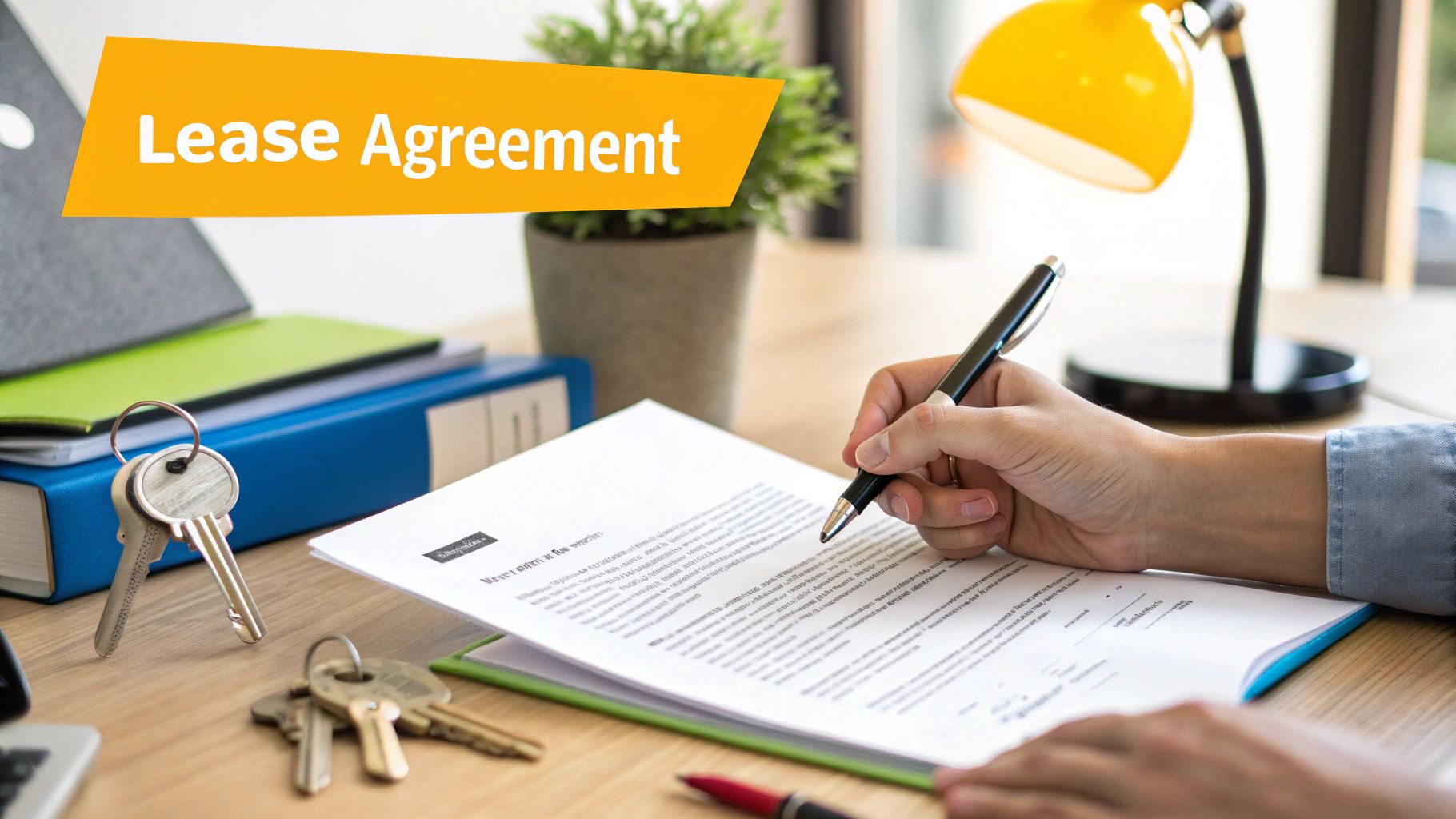
You’ve done the legwork—toured the neighbourhoods, viewed the properties, and finally found the perfect appartement a louer casablanca. It's an exciting moment, but now comes the most critical part of the process: making it legally yours.
This final stage is all about contracts and paperwork. It’s the formal handshake that protects both you and the landlord. While it can feel a bit intimidating, especially if you're new to the Moroccan system, knowing what to expect makes it a straightforward finale to your apartment hunt.
Getting Your Paperwork in Order
Before you even see a contract, a landlord or agency will want to know who you are and that you can reliably pay the rent. Coming prepared with your documents ready to go shows you’re organised and serious. It makes a great first impression and can speed everything up.
While the exact list might vary slightly, you’ll want to have these essentials on hand.
For all tenants, you should prepare:
- A copy of your identity card. For Moroccans, this is your CIN (Carte d'Identité Nationale).
- Proof of your income. This usually means your last three payslips. An 'attestation de travail' from your employer confirming your role and salary is also standard.
- Your bank details. A RIB (Relevé d'Identité Bancaire) from a local Moroccan bank is often needed to set up future rent payments.
If you’re an expat, the landlord will also need to see proof that you’re legally residing and working in the country.
Additional documents for expatriates:
- A copy of your passport. Make sure it’s valid and won't expire during your tenancy.
- Your residence permit ('carte de séjour'). This is the key document. If your application is still being processed, the official receipt ('récépissé') might work as a temporary substitute.
- An employment letter. A letter from your company confirming your job in Morocco goes a long way in building trust.
Decoding the Moroccan Lease Agreement
The heart of the deal is the lease itself, known as the 'contrat de bail'. This is your legally binding agreement, outlining everything from payment schedules to who fixes a leaky tap. Landlords often use a standard template, but never assume it’s all boilerplate. You must read every word.
The contract will almost certainly be in French or Arabic. If you aren't fluent, it is absolutely essential to get help. Ask a trusted, fluent friend or hire a professional to review it with you. Guessing the meaning of a legal clause is a recipe for disaster down the line.
A common pitfall is glossing over the 'clauses particulières'—the special conditions. This is the landlord's chance to add custom rules, like a no-pets policy or restrictions on subletting. Pay close attention here to avoid any nasty surprises later on.
Key Clauses to Double-Check
The whole contract matters, but from my experience, a few specific clauses cause the most confusion when renting an appartement a louer casablanca. Give these sections an extra-close look.
- The Security Deposit ('Caution'): The contract must specify the deposit amount. By law, this can't be more than two months' rent. It should also be crystal clear about the conditions for getting your money back when you move out.
- Rent Payment Terms: Look for the exact rent amount, the due date each month, and how you're expected to pay (bank transfer is most common). Be wary of vague language that could allow for sudden rent hikes.
- Maintenance and Repairs ('Entretien et Réparations'): A good lease clearly defines what you’re responsible for (minor things like changing a lightbulb) versus what the landlord must handle (major issues with plumbing, electricity, or the building structure). Make sure this division feels fair.
- Notice Period ('Préavis'): Find out how much notice you need to give before moving out. It's usually one to three months. Knowing this is crucial for a smooth departure and ensuring you get your deposit back without any hassle.
By gathering your documents ahead of time and carefully reviewing the contrat de bail, you take control of the process. This diligence is the best way to ensure your rental experience in Casablanca is a positive and secure one.
Your Move-In and Settling-In Checklist
You’ve signed the lease and have the keys in hand – congratulations! The search for your appartement a louer casablanca is officially over. Now comes the exciting part: turning this new space into your home. A seamless move-in really sets the tone for your entire stay, and it all starts with one absolutely critical step.
That first step is the move-in inspection, known locally as the 'état des lieux d'entrée'. Think of this as your primary tool for safeguarding your security deposit. It’s a formal walkthrough with the landlord or agent to document the apartment's exact condition before a single one of your boxes comes through the door.
Don't rush this process. Be incredibly thorough. Take detailed photos and videos of everything, focusing on existing scuffs, scratches on the floor, or hairline cracks in tiles. You'll want to test every appliance, check the water pressure in the showers, and flip every single light switch. This creates a clear, undeniable record that prevents any "he said, she said" arguments about the property's condition when your tenancy ends.
Getting Connected: Utilities and Internet
Once the inspection is squared away, your immediate priority is getting the lights on and the water running. This means setting up your own accounts for electricity, water, and sometimes gas. In Casablanca, your go-to provider for this is LYDEC.
- Electricity & Water: You'll need to head to a local LYDEC agency. Bring your signed lease agreement, your identity card (or passport and carte de séjour), and a copy of the landlord’s ID. Their staff will walk you through the account setup.
- Internet: Here, you have choices. The main players are Maroc Telecom, Orange, and inwi, each offering a range of fibre and 4G home internet packages. It's wise to compare their latest offers online or pop into a local store to see what best suits your streaming and browsing habits.
This is a good moment to appreciate why investing in Casablanca real estate is so attractive. The city currently boasts one of Morocco's highest gross rental yields, averaging around 7.87% as of mid-2025. That figure is well above the national average, making it a sound choice for property owners. You can explore more data on rental yields in Morocco on Global Property Guide.
Expert Tip: Don't leave utility activation for your actual move-in day. Contact the providers at least a week ahead of time. A little bit of foresight is all it takes to avoid spending your first night in a new apartment in the dark.
Finding Your Footing in the Neighbourhood
Settling in is about so much more than just unpacking boxes; it’s about weaving yourself into the fabric of your new community. Start by taking a walk. Pinpoint the essentials: your closest hanout (the small corner shop that has everything), a great bakery for your morning bread, and the local market (souk) for fresh fruit and vegetables.
Make an effort to embrace the local way of life. A warm "Salam alaykum" (peace be upon you) goes a surprisingly long way when you enter a shop or greet your neighbours. Showing respect for local customs, such as dressing a bit more modestly in public spaces, will help you build positive connections and make Casablanca truly feel like home.
For a deeper dive into the rental process, be sure to read our comprehensive guide on renting an apartment in Casablanca.
Got Questions About Renting in Casablanca? We've Got Answers
Stepping into Casablanca's rental scene can feel like learning a new dance. Between local customs and unfamiliar paperwork, it’s only natural to have a few questions. When you're searching for an appartement a louer casablanca, knowing what to expect can make all the difference.
We've pulled together the questions we hear most often from renters just like you. Think of this as your cheat sheet for a smoother, more confident rental journey.
How Much Is the Security Deposit?
Almost without exception, you'll be asked for a security deposit—what's locally known as a caution—equal to two months' rent. This is standard practice across Casablanca. You'll pay this amount to the landlord, along with your first month's rent, before they hand over the keys.
Don't worry, this isn't just extra rent. The deposit acts as the landlord's insurance against any damages beyond normal wear and tear. Moroccan law is clear on this: as long as you leave the apartment in the same condition you found it (as noted in the move-in inspection, or état des lieux), your landlord is required to return the full amount when your lease ends.
Do I Really Need a Moroccan Bank Account?
Technically, it might not be a strict legal must-have for every single rental, but practically speaking? Yes, you absolutely need one. The overwhelming majority of landlords in Casablanca prefer rent payments via bank transfer (virement bancaire). It’s clean, efficient, and creates a paper trail for both of you.
For expats, setting up a local account is one of the first and most important steps to getting settled. It makes life infinitely easier, not just for rent but for paying your electricity, internet, and other bills. To open an account, banks will typically ask for your passport and proof of address, which can be your residency permit (carte de séjour) or the registered lease agreement itself.
A local bank account does more than just simplify payments. It signals to landlords that you're organised, settled, and serious—making you a much more appealing candidate.
Should I Look for a Furnished or Unfurnished Place?
You’ll find both, but the long-term rental market here definitely leans toward unfurnished (vide) apartments. This is great for anyone looking to put their own stamp on a place. It gives you the freedom to choose your own furniture and truly make the space feel like home.
Furnished (meublé) apartments are more common for short-term lets or in expat-heavy areas like Gauthier. They offer convenience but at a premium—expect to pay more in rent. If you do go for a furnished option, make sure you get a clear list of what's included. "Furnished" can mean anything from the bare essentials to a fully kitted-out home.
For a deeper dive, check out our complete list of frequently asked questions about renting in Casablanca.
At Rich Lion Properties, we're here to make your property search simple and successful. Visit us at richlionproperties.com to see our exclusive listings and let our experienced team help you find your ideal home in Casablanca.
